
As I got more and more experienced in audio editing while being a part of the FixThePhoto team, I decided to find the best mouse for music production on the market to improve my workflow.
A high-quality mouse offers superior tracking, precision, and reliability while also sporting configurable buttons that allow me to handle even the most repetitive tasks more efficiently.
That’s why I wanted to test the most popular mice among my colleagues and internet users to pick the optimal model for my specific needs.
I, similarly to most beginning music producers, started by using a simple two-button mouse that often comes for free when getting pre-built machines. If you’re still living like that, you’ll be amazed by how much more productive you can be if you upgrade to a better mouse.
The newest Logitech MX Master 3 is the best mouse for audio editing I’ve had the pleasure to use. This model has seen multiple upgrades over the years and now offers peak ergonomics and functionality.
It comes with extra buttons, which you can configure for individual applications, allowing you to boost your productivity in DAW software. It feels great in my hand and I didn’t get tired even after using it for hours. It’s powered by a Lithium-ion battery, which can be recharged via USB. You can pair it with up to 3 devices at the same time, which is very convenient.
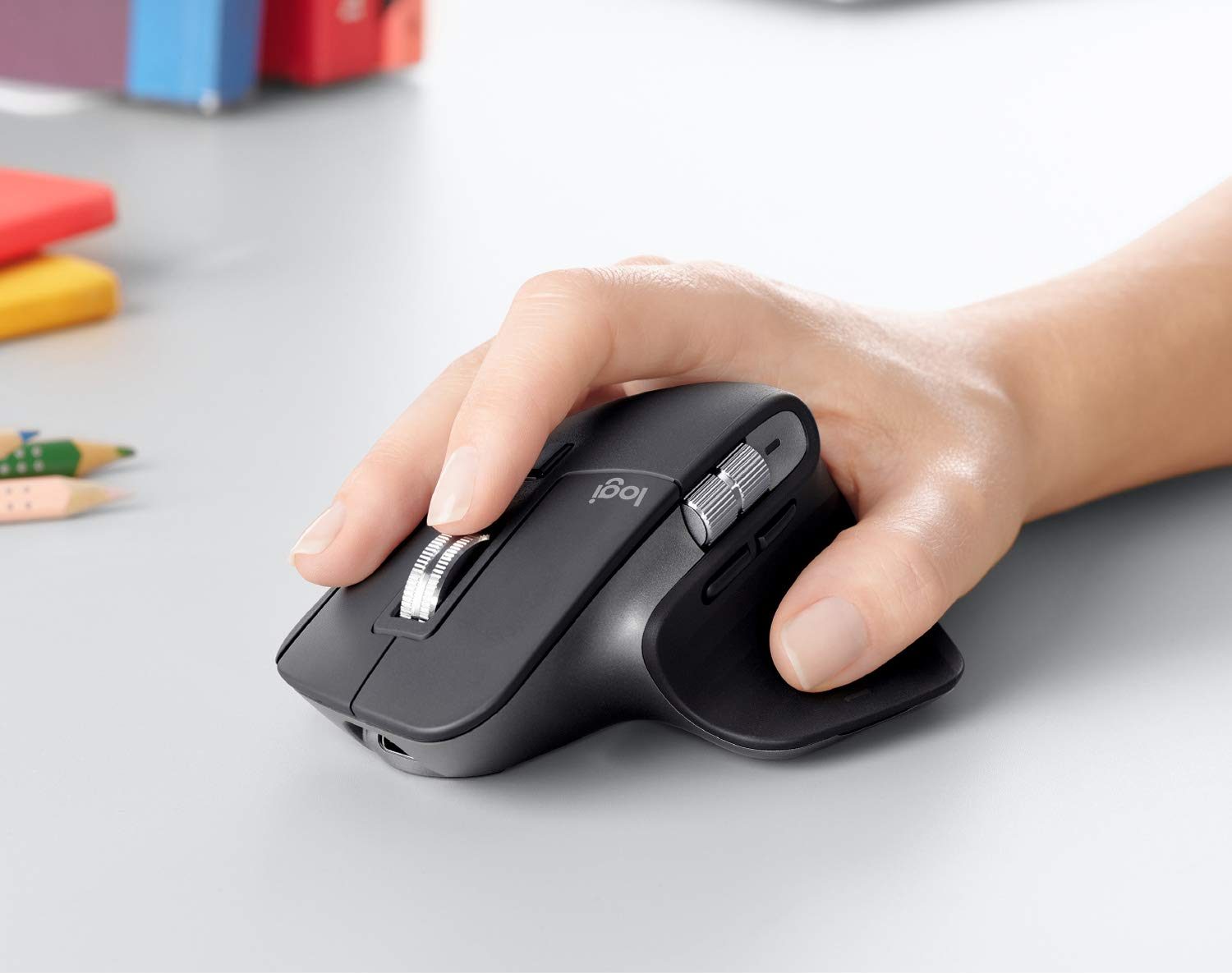
Music producers like me, who are also into photography, were happy to find out that this mouse for photo editing comes with premade configurations for Adobe Photoshop, Adobe Premiere Pro, Final Cut Pro, Microsoft Office, and other applications.
Specs:
|
Compatibility |
Chrome OS, Windows, dedicated Mac version for macOS and iPadOS |
|
Resolution |
≤ 4,000 dpi |
|
Buttons |
7 |
|
Scroll wheel |
Scroll wheel, thumbwheel |
|
Connectivity |
Wireless 2.4GHz RF, Bluetooth (Mac) |
|
Battery |
Rechargeable |
|
Handedness |
Right |
This wireless DAW mouse under 40 dollars impressed me with both its convenience and speed. The top of this model has a 46o tilt, which helps my hand and forearm to be placed more comfortably, which is better for prolonged use.
I think the chunky design is a bit off-putting and it took me a while to get accustomed to it, but the manufacturers state that such a build helps prevent soft tissue compression, which is beneficial for your health.
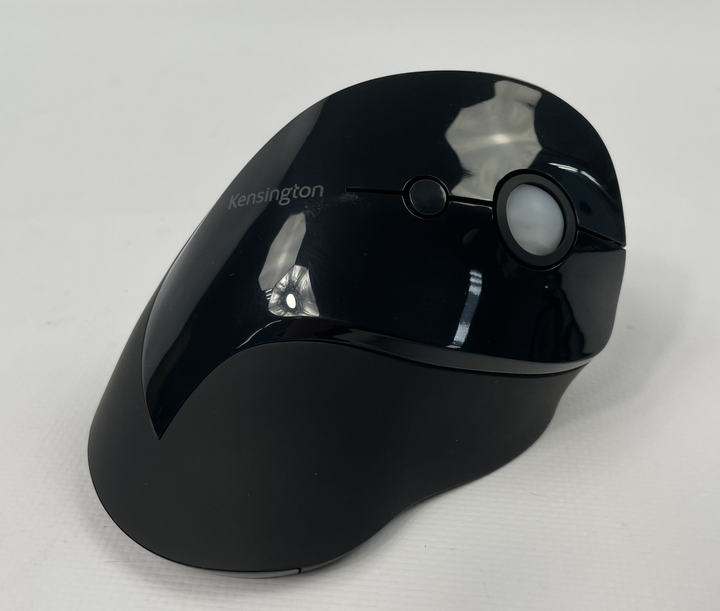
The Kensington Pro Fit Ergo comes with 6 configurable buttons, a high-res 1,600 dpi laser, and a scroll wheel, which supports both horizontal and vertical scrolling, as this versatile mouse ensured I navigated my DAW with maximum convenience.
Specs:
|
Compatibility |
Chrome OS, iPadOS, Windows |
|
Resolution |
≤ 1,600 dpi |
|
Buttons
|
6 |
|
Scroll wheel |
Horizontal and vertical |
|
Connectivity |
2.4GHz RF Wireless |
|
Battery |
1 x AA |
|
Handedness |
Right |
I didn’t expect much from 400 dpi, but this model impressed me with its fantastic turn speeds, which is why it’s probably the best mouse for Pro Tools and similar software I’ve tried.
It offers the power I need to move the cursor across a huge screen with a single finger spin. At lower speeds, the ball offers terrific accuracy, which is essential for music production. You can also use it as a CAD mouse, and, similar to the majority of trackballs, it lets you make important selections without risking nudging the cursor by accident.
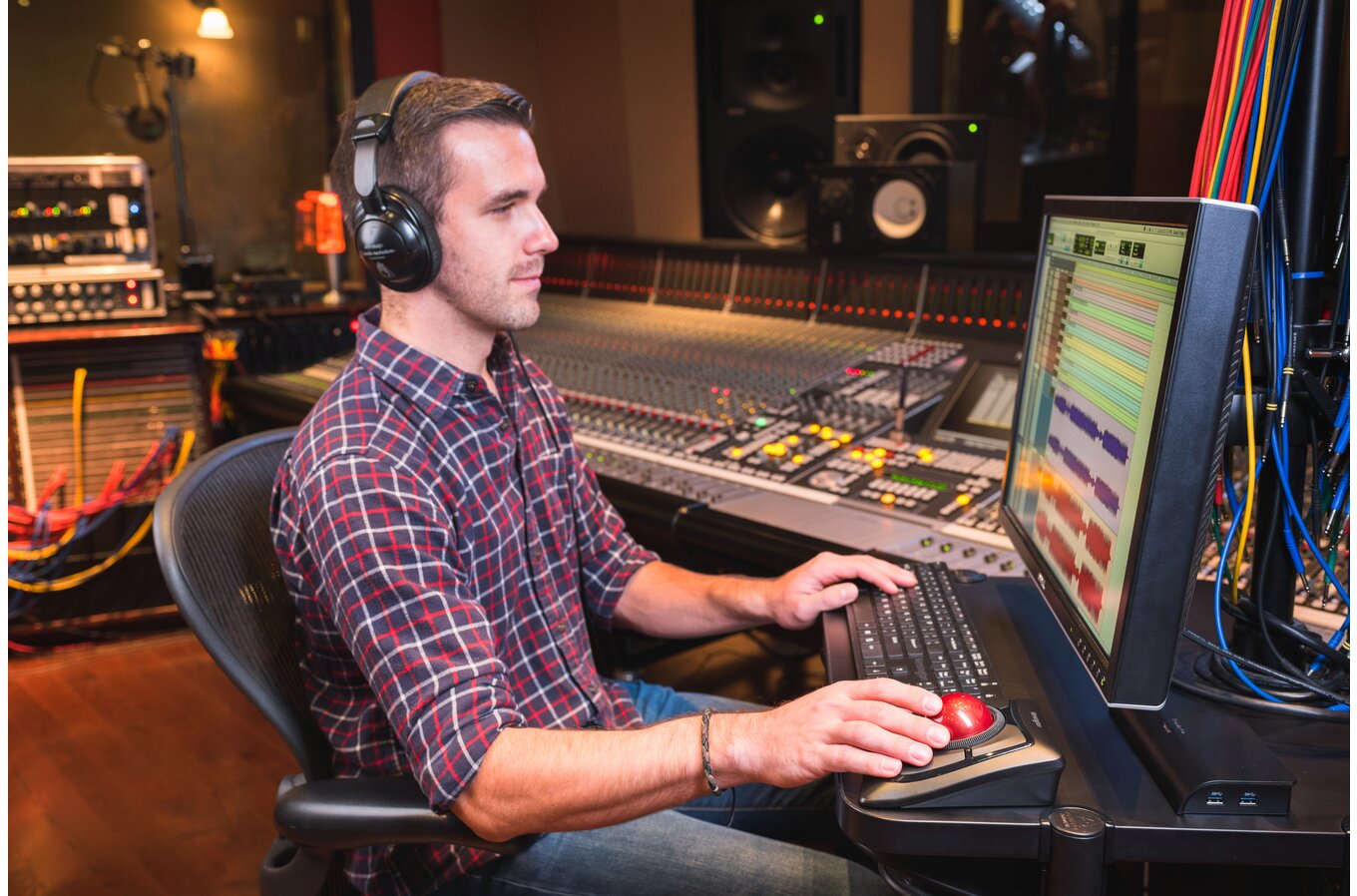
This mouse could benefit from some improvements, as it only has 4 buttons and it’s a bit too big to carry in a laptop bag. It’s also impossible to do horizontal scrolling without pressing down the modifier button. However, this mouse is still very enjoyable to use, particularly when working in a crowded studio environment.
Specs:
|
Compatibility |
Chrome OS, macOS, iPadOS, Windows |
|
Resolution |
400 dpi |
|
Buttons |
4 |
|
Scroll wheel
|
Vertical |
|
Connectivity |
2.4GHz RF, Bluetooth Wireless |
|
Battery |
2 x AA |
|
Handedness |
Ambidextrous |
This model has an unconventional design that is supposed to decrease muscle stress by 20% while increasing hand and forearm comfort. It allows me to tilt the mouse up to 20o to accommodate my forearm’s natural posture.
The thumbwheel provides superfast and precise tracking. Whether you’re interested in making quick movements or precise changes, the MX Ergo is capable of both. A convenient button, placed right behind the ball, allows me to conveniently swap between fast-tracking and precision modes.
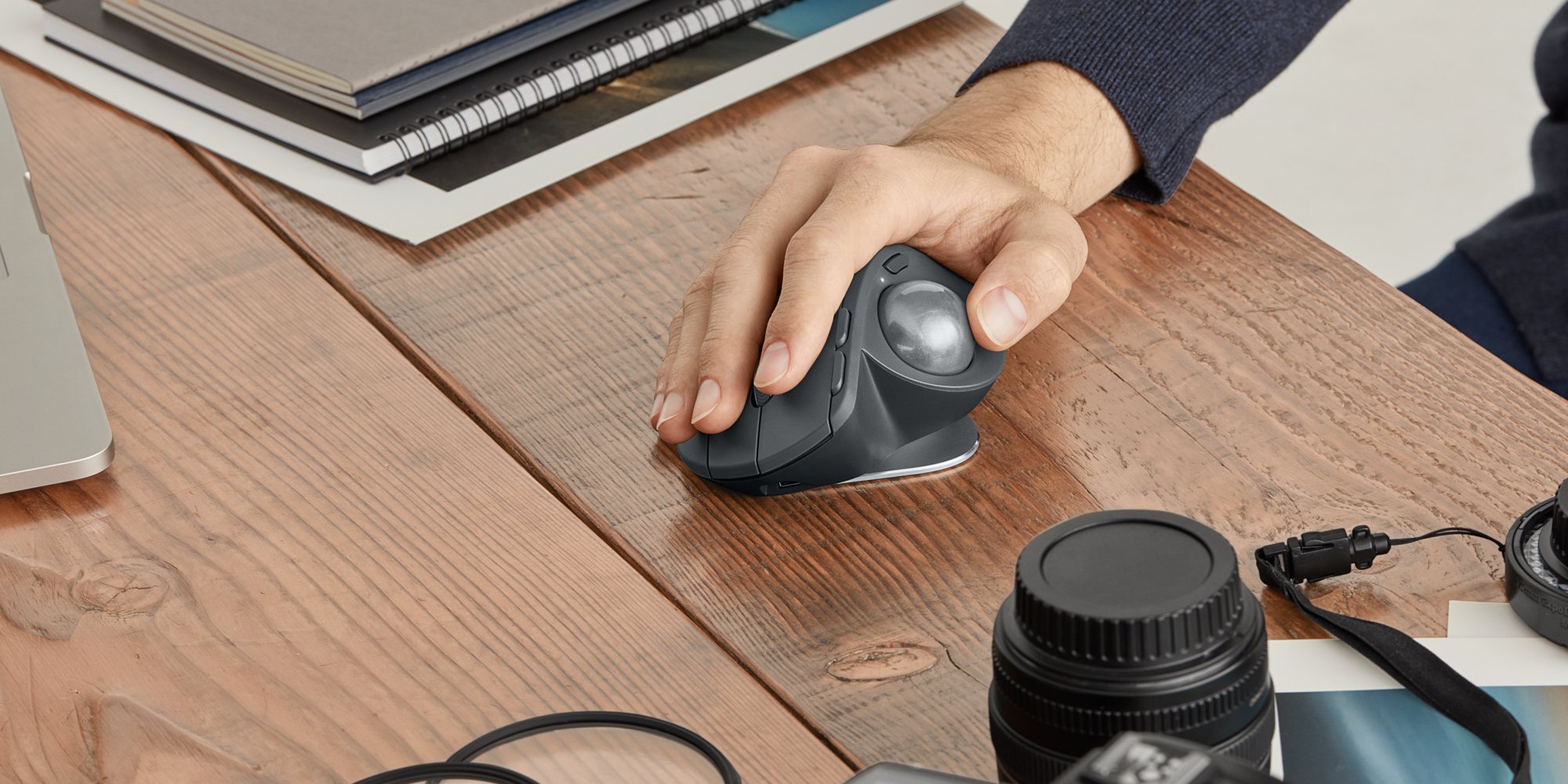
The 6 provided configurable buttons ensure this is a great trackball mouse for music production, as you can use it to create shortcuts for your DAW, or any other application. This mouse for video editing is supplied with preset shortcuts for Photoshop, Premiere Pro, Final Cut Pro, Microsoft Office, etc.
Specs:
|
Compatibility |
Windows, macOS, iPadOS |
|
Resolution |
≤ 2,048 dpi |
|
Buttons |
8, 6 programable |
|
Scroll wheel |
Scroll wheel, thumbwheel |
|
Connectivity |
Wireless 2.4GHz RF, Bluetooth |
|
Battery |
Rechargeable |
|
Handedness
|
Right |
This is an incredibly stylish mouse that not only looks great but is also rather comfortable to use. Although some users mention getting fatigued during prolonged sessions. I suggest purchasing a wrist adapter to improve its ergonomics.
It offers smooth scrolling and I had no issue quickly moving the cursor across the screen. A minor gripe of mine is the limited configuration support of the two main buttons and gesture controls.

The Apple Magic Mouse is a respectable option if you’re using music production software for beginners and professionals alike. It’s enjoyed by many industry professionals around the globe and if you’re looking for a stylish studio mouse, this might be your best choice.
Specs:
|
Compatibility |
macOS, iPadOS |
|
Resolution |
Unknown |
|
Buttons |
No |
|
Scroll wheel |
No |
|
Connectivity |
Bluetooth |
|
Battery |
Rechargeable |
|
Handedness |
Ambidextrous |
After using the Magic Trackpad for a while, I have found its design to be very reminiscent of the Magic Mouse while also being more functional. In contrast to the Apple mouse reviewed above, this model can be used in wired and wireless modes, which is very convenient when your battery suddenly dies on you.
It's similar to a large-size trackpad that you'd find on a laptop. I enjoyed tracking and swiping while leveraging the pressure-sensitive surface and haptic feedback to send out precise commands.

However, my favorite feature about this producer mouse trackpad is the Force Touch technology that significantly expands its functionality when using apps like Adobe Audition and Pro Tools. Pressing the surface stronger will bring up a variety of handy shortcuts, including the ability to add notes to the Piano Roll and set automation points.
Specs:
|
Compatibility |
macOS, iPadOS |
|
Resolution |
Unknown |
|
Buttons |
No |
|
Scroll wheel |
No |
|
Connectivity |
Bluetooth |
|
Battery |
Rechargeable |
|
Handedness |
Ambidextrous |
After unpacking this mouse, I was instantly impressed by its comfortable, rubberized grip and thumb rest that allows me to edit audio in Pro Tools for hours without ever feeling tired. Additionally, I appreciate the configurable buttons and gesture controls that let me ensure the setup is optimized for my specific needs.
The dual scroll wheels are highly functional and make this model a fantastic mouse for heavy gaming. It offers a DPI of 8,000 that secures terrific tracking precision, even when working on suboptimal surfaces.
However, my favorite feature is the "Quiet Click" mechanical switches, which let me enjoy a pleasant tactile response while the ability to connect the mouse to up to 3 devices at the same time makes it even more versatile.
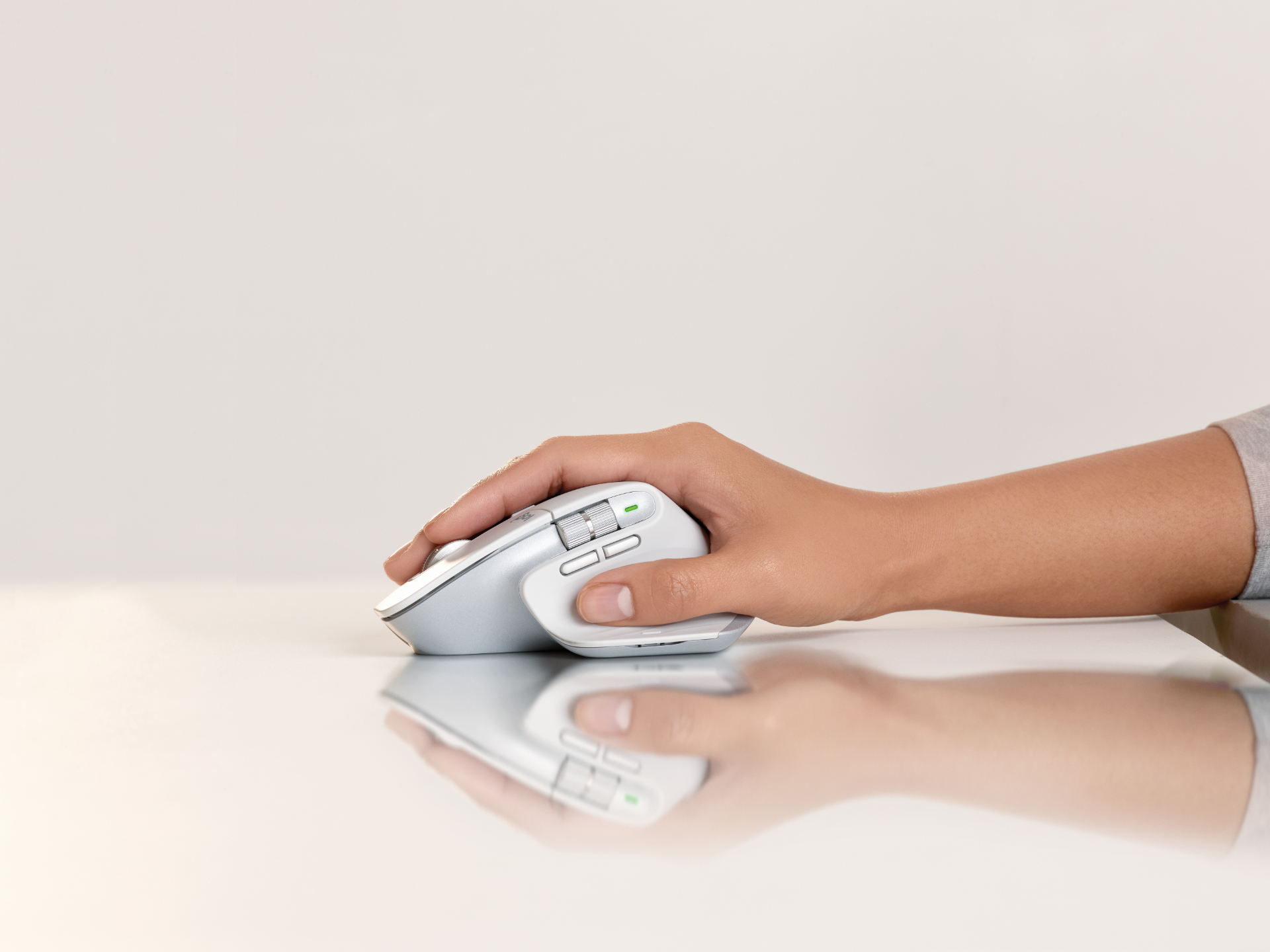
This mouse for a music producer also has a durable battery that can last up to 70 days. If you’re interested in a flat model that can be used wired and wirelessly and you aren’t tight on funds, the Logitech MX Master 3S should be right up your alley.
Specs:
|
Compatibility |
Windows, macOS, Linux, ChromeOS, iPadOS, and Android |
|
Resolution |
up to 8,000 DPI |
|
Buttons |
7 programmable |
|
Scroll wheel |
Dual scroll wheels (vertical and horizontal) with adjustable scroll speed |
|
Connectivity |
Wireless via Bluetooth Low Energy or the Logi Bolt USB receiver |
|
Battery |
Rechargeable |
|
Handedness |
Right-handed |
This trackball mouse offers terrific ergonomics, convenient thumb controls, and great accuracy, allowing you to enjoy long music production sessions in FL Studio and Logic Pro X. It also has a tilted design that minimizes muscle strain and fatigue.
It’s probably the best mouse for Logic Pro if you value tracking precision and usually work on unconventional services (even cluttered tables) that would be impossible for a regular mouse to handle. The configurable DPI parameters let you adjust the sensitivity as you see fit. I also appreciate the wireless nature of this mouse, which can be connected to my PC via Bluetooth or USB.

The provided long-lasting battery can be conveniently recharged, meaning you never have to buy spares. That said, the lack of configurable buttons might make it inconvenient to use for certain users.
Specs:
|
Compatibility |
Windows, Mac, iPad |
|
Resolution |
Up to 1200 DPI |
|
Buttons |
6 |
|
Scroll wheel |
Yes |
|
Connectivity |
Bluetooth and 2.4GHz wireless via USB dongle |
|
Battery |
Rechargeable |
|
Handedness |
Ambidextrous |
Even though the Shuttle Pro V2 isn’t a traditional mouse for production and audio editing, I still think it can be a reasonable replacement for your current mouse. It’s extremely convenient and has a shuttle/jog wheel combination for quick/slow track scrolling, as well as 15 configurable buttons for using shortcuts and macros.
This nifty small device allows me to navigate with my free hand while still performing mouse-based editing tasks with my main hand, which is why it’s a fantastic mouse for graphic design. The fact that my non-dominant hand has something to do now has helped me significantly improve my productivity.
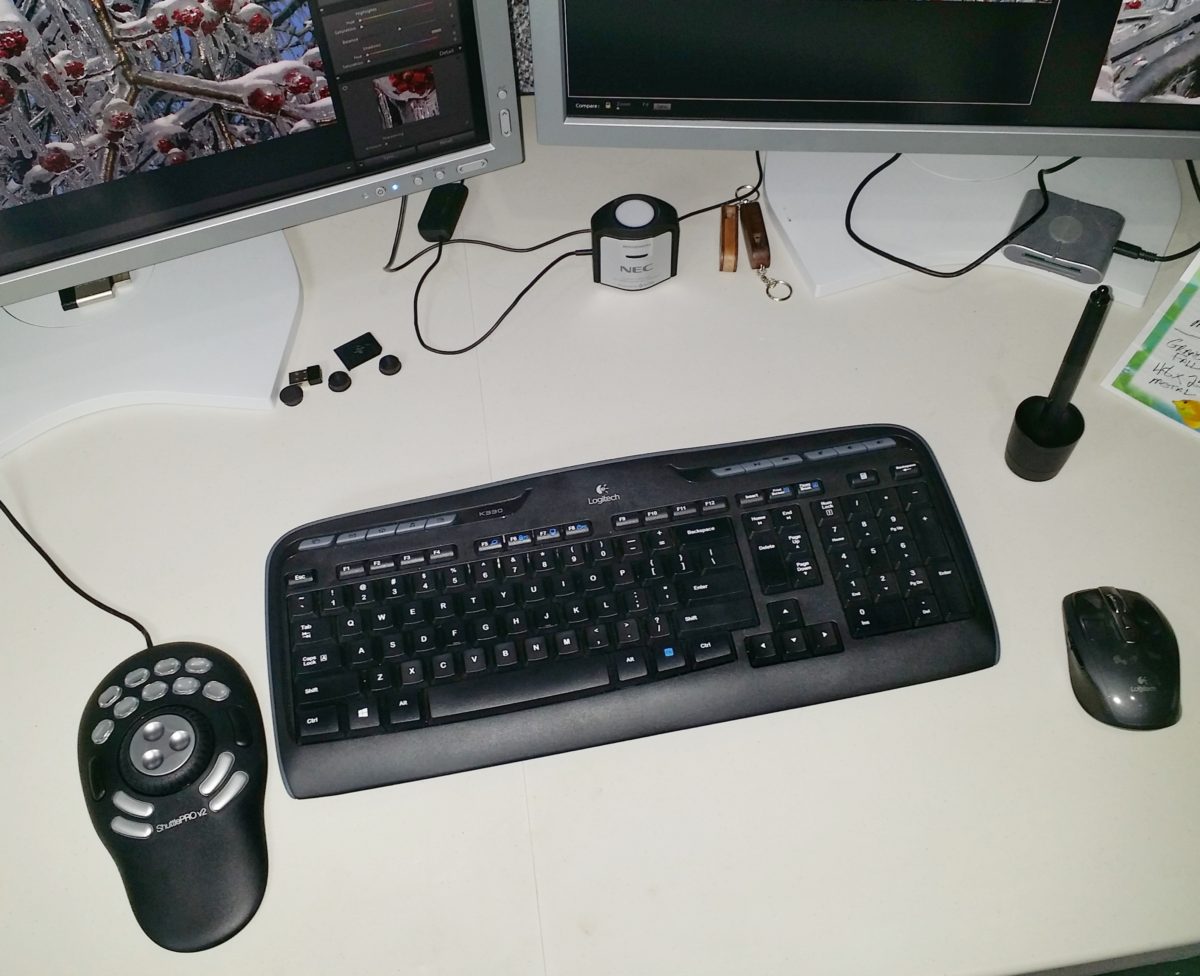
The buttons are easily programmable, but the Shuttle Pro V2 comes with preset parameters for most popular DAWs and video editing applications, which is why it’s widely used by music producers and creators like me.
Specs:
|
Compatibility |
Windows, macOS |
|
Resolution |
n/a |
|
Buttons |
15 |
|
Scroll wheel |
Shuttle/Jog |
|
Connectivity |
Wired |
|
Battery |
n/a |
|
Handedness |
Ambidextrous |
Configuration. First you have to decide what type of device you’re interested in – a mouse, trackball, or trackpad.

Mouse. A true mouse for music production offers a fair share of benefits, the most important of which is familiarity. Contemporary models offer terrific speed, precision, ergonomics, and dependability. Upgrading from an old, basic mouse to a more advanced model will do wonders for boosting your productivity without breaking the bank.

Trackball. The most appealing feature of trackballs is their small size. Moving the cursor from one part of a 30-inch monitor to the other with a mouse usually needs a foot of surface area, while a trackball needs less than 25% of that. If your workspace already has a lot of clutter because of the different audio gear, then you can’t go wrong with a trackball.
Another notable benefit is the offered ability to press buttons without risking accidentally moving the cursor, which can be essential when making highly accurate selections. Meanwhile, the lightest nudge can completely move the mouse out of position. Some brands also state that trackballs minimize RSI risks since you don’t need to grip and manhandle them like a mouse.
Trackpad. Trackpads offer comparable benefits to trackballs, while also supporting touch sensitivity and gesture controls. If you have a laptop, you already know how to employ such devices and they also look quite stylish.
Configurable buttons. If you feel like having music production feels boring because of the repetitive tasks you need to do in your DAW or music mixing software then get a mouse with configurable buttons.
By personalizing all the buttons on a premium music production mouse, you’ll no longer need to rely on your keyboard to bring up the mixer or looping different sections. This will help you avoid making pointless clicks to rewind, forward wind, and playback elements while you’re working on your project.
Connectivity. While a wireless mouse can feel too slow for a gamer, for a music production expert the provided speeds should be more than enough. Wires add unnecessary clutter and having a wireless mouse can also help record instruments when you have a bit of distance between you and the DAW.
Wireless models usually have Bluetooth or 2.4GHz radio (RF) connectivity. RF provides lower latency but needs a USB dongle to work, meaning you’ll have to dedicate one of your limited USB ports to it. Bluetooth offers lower speeds, but most PCs and laptops come with integrated receivers.
Sensitivity. Mouse sensitivity is calculated in dots per inch (dpi). The higher the value, the better the speed and accuracy you get to enjoy. Gamers prefer blue gaming mice with maximum sensitivity, and most producers and musicians also usually get a mouse that offers an increased level of accuracy. However, if your mouse has a very high DPI, that doesn’t mean you need to set it to the maximum setting and have the cursor fly around the screen.

Ergonomics. Companies like Kensington, Logitech, and Contour have all created ergonomic mouses, including vertical models, which supposedly help deal with RSI-type injuries. Trackballs and trackpads are also known for helping avoid such issues.